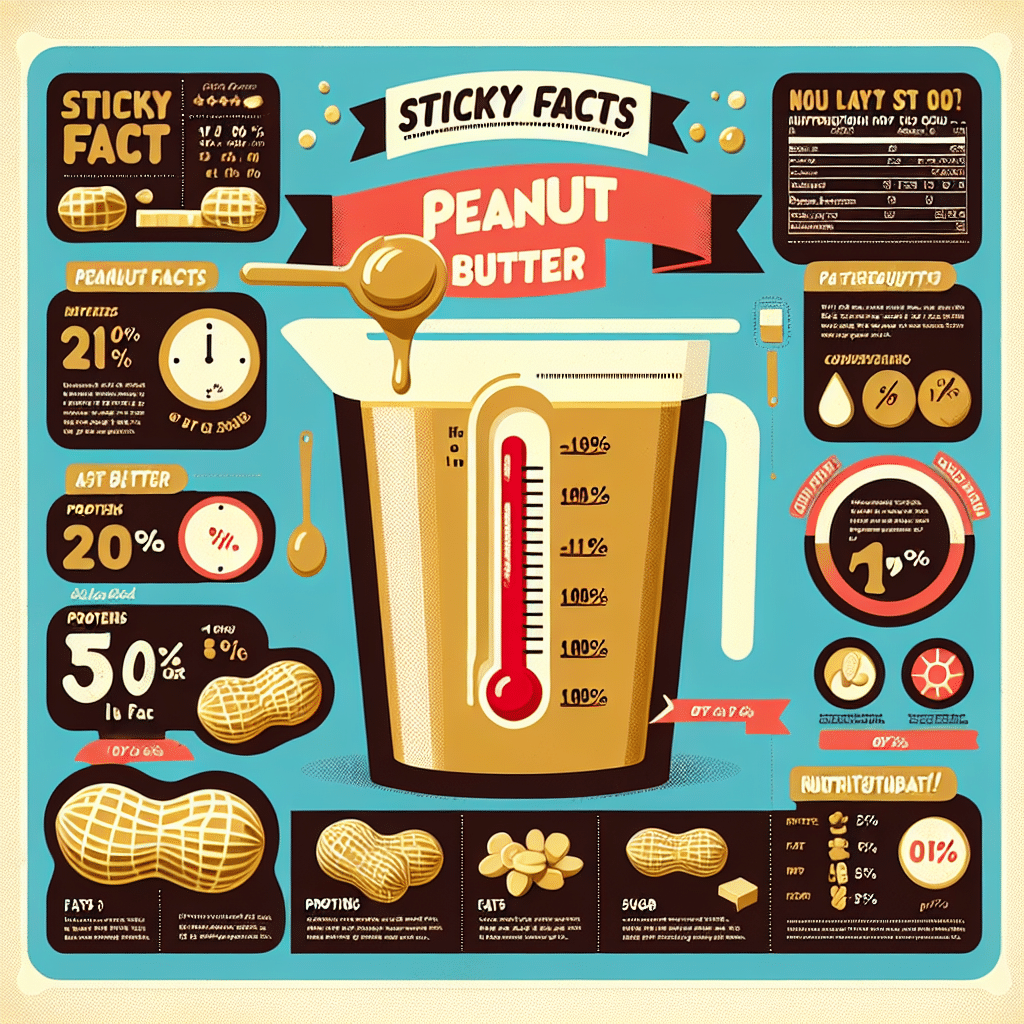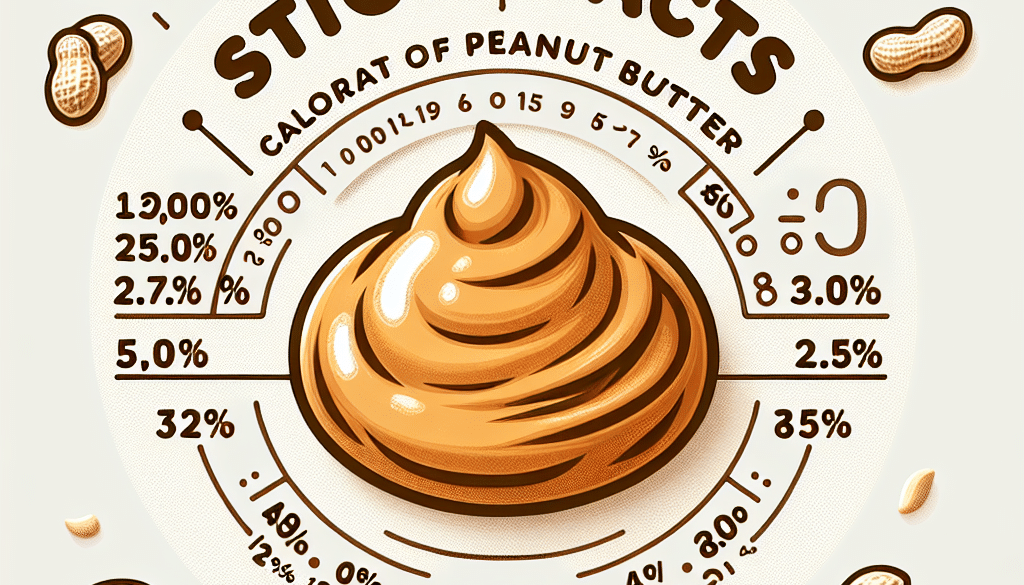Calories in 1 Oz of Peanut Butter: Sticky Facts
-
Table of Contents
- Calories in 1 Oz of Peanut Butter: Uncovering Sticky Facts
- Understanding the Caloric Content
- Nutritional Breakdown of Peanut Butter
- Health Benefits and Risks
- Comparing Different Types of Peanut Butter
- Practical Tips for Including Peanut Butter in Your Diet
- Case Studies and Research
- Conclusion: Balancing Taste and Nutrition
- Discover ETprotein’s High-Quality Protein Products
Calories in 1 Oz of Peanut Butter: Uncovering Sticky Facts

Peanut butter is a staple in many households, loved for its creamy texture and rich, nutty flavor. It’s a versatile spread that can be found in everything from sandwiches to smoothies. But beyond its delicious taste, peanut butter is also a source of nutrition, providing protein, healthy fats, and various vitamins and minerals. However, one question that often arises for those monitoring their diet is: How many calories are in 1 oz of peanut butter? Let’s delve into the sticky facts and uncover the nutritional profile of this beloved spread.
Understanding the Caloric Content
When it comes to calorie counting, precision is key. An ounce of peanut butter, which is equivalent to about two tablespoons, typically contains between 160 to 190 calories. The exact number can vary depending on the brand and whether it’s regular, reduced-fat, or natural peanut butter. It’s important to note that while reduced-fat versions might have fewer calories, they often contain more added sugars and fillers to compensate for the loss of flavor and texture.
Nutritional Breakdown of Peanut Butter
Aside from calories, peanut butter offers a range of nutrients that contribute to its health benefits:
- Protein: An ounce of peanut butter provides about 7 grams of protein, which is essential for muscle repair and growth.
- Healthy Fats: The majority of the fats in peanut butter are monounsaturated and polyunsaturated, known for their heart-healthy properties.
- Fiber: With about 2 grams per ounce, peanut butter can help with digestive health and satiety.
- Vitamins and Minerals: Peanut butter is a good source of vitamins E and B6, magnesium, potassium, and zinc.
It’s clear that peanut butter is more than just a calorie-dense food; it’s packed with valuable nutrients that can be part of a balanced diet.
Health Benefits and Risks
Consuming peanut butter in moderation can offer several health benefits:
- It can help reduce the risk of heart disease due to its healthy fat content.
- The protein and fiber in peanut butter can aid in weight management by promoting feelings of fullness.
- It’s a convenient source of energy, making it a favorite among athletes and fitness enthusiasts.
However, there are also risks to consider. Peanut butter is high in calories and can contribute to weight gain if consumed in excess. Additionally, some brands contain added sugars, hydrogenated oils, and preservatives that diminish its health benefits.
Comparing Different Types of Peanut Butter
Not all peanut butters are created equal. Here’s a comparison of different types:
- Regular Peanut Butter: Often contains added sugars and fats, which can increase the calorie count.
- Natural Peanut Butter: Typically made with just peanuts and salt, offering a purer nutritional profile.
- Reduced-Fat Peanut Butter: Lower in calories but potentially higher in unwanted additives.
Choosing the right type of peanut butter depends on your dietary preferences and health goals.
Practical Tips for Including Peanut Butter in Your Diet
Here are some tips for enjoying peanut butter without overindulging:
- Measure your servings to avoid consuming more calories than intended.
- Opt for natural peanut butter to minimize added sugars and unhealthy fats.
- Incorporate peanut butter into balanced meals that include fruits, vegetables, and whole grains.
By being mindful of portion sizes and choosing quality products, you can make peanut butter a nutritious addition to your diet.
Case Studies and Research
Several studies have highlighted the benefits and potential drawbacks of peanut butter consumption:
- A study published in the Journal of the American Medical Association found that consuming peanut butter could lower the risk of type 2 diabetes in women.
- Research in the British Journal of Nutrition suggested that peanut butter intake was associated with a reduced risk of cardiovascular disease.
- However, a study in The American Journal of Clinical Nutrition cautioned against high consumption of peanut butter with added trans fats, which could negate its health benefits.
These studies underscore the importance of choosing the right type of peanut butter and consuming it in moderation.
Conclusion: Balancing Taste and Nutrition
In conclusion, while 1 oz of peanut butter packs a calorie punch, it also offers substantial nutritional value. By understanding the caloric content and choosing the right type of peanut butter, you can enjoy this delicious spread without compromising your health goals. Remember to enjoy peanut butter as part of a varied and balanced diet to reap its benefits while keeping calorie intake in check.
Discover ETprotein’s High-Quality Protein Products
If you’re looking to enhance your diet with additional protein sources, consider exploring ETprotein’s range of products. Their organic bulk vegan protein options, such as rice, pea, and peanut protein, are perfect for those seeking non-GMO, allergen-free alternatives. ETprotein caters to a wide array of industries, ensuring that you can find the right protein solution for your needs.
About ETprotein:
ETprotein, a reputable protein Chinese factory manufacturer and supplier, is renowned for producing, stocking, exporting, and delivering the highest quality organic bulk vegan protein and plant proteins. They include Organic rice protein, clear rice protein, pea protein, clear pea protein, pumpkin seed protein, sunflower seed protein, mung bean protein, peanut protein etc. Their offerings, characterized by a neutral taste, non-GMO, allergen-free attributes, cater to a diverse range of industries. They serve nutraceutical, pharmaceutical, cosmeceutical, veterinary, as well as food and beverage finished product distributors, traders, and manufacturers across Europe, USA, Canada, Australia, Thailand, Japan, Korea, Brazil, and Chile, among others.
ETprotein specialization includes exporting and delivering tailor-made protein powder and finished nutritional supplements. Their extensive product range covers sectors like Food and Beverage, Sports Nutrition, Weight Management, Dietary Supplements, Health and Wellness Products, and Infant Formula, ensuring comprehensive solutions to meet all your protein needs.
As a trusted company by leading global food and beverage brands and Fortune 500 companies, ETprotein reinforces China’s reputation in the global arena. For more information or to sample their products, please contact them and email sales(at)ETprotein.com today.












